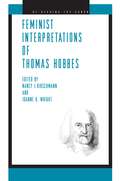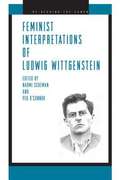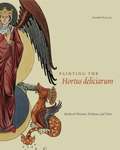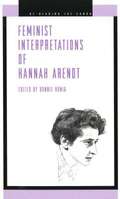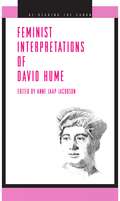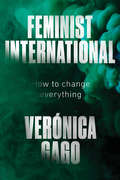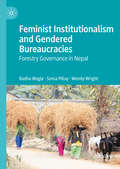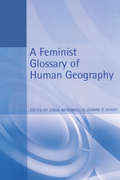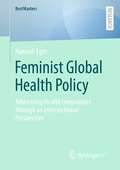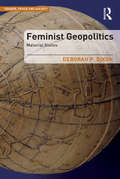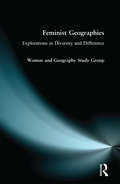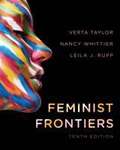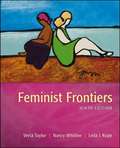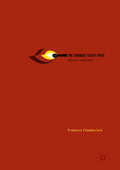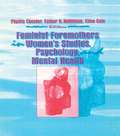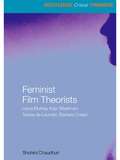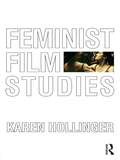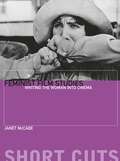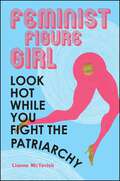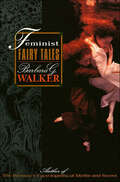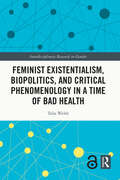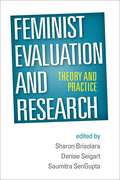- Table View
- List View
Feminist Interpretations of Thomas Hobbes (Re-Reading the Canon)
by Nancy J. Hirschmann Joanne H. WrightFeminist Interpretations of Thomas Hobbes features the work of feminist scholars who are centrally engaged with Hobbes’s ideas and texts and who view Hobbes as an important touchstone in modern political thought. Bringing together scholars from the disciplines of philosophy, history, political theory, and English literature who embrace diverse theoretical and philosophical approaches and a range of feminist perspectives, this interdisciplinary collection aims to appeal to an audience of Hobbes scholars and nonspecialists alike.As a theorist whose trademark is a compelling argument for absolute sovereignty, Hobbes may seem initially to have little to offer twenty-first-century feminist thought. Yet, as the contributors to this collection demonstrate, Hobbesian political thought provides fertile ground for feminist inquiry. Indeed, in engaging Hobbes, feminist theory engages with what is perhaps the clearest and most influential articulation of the foundational concepts and ideas associated with modernity: freedom, equality, human nature, authority, consent, coercion, political obligation, and citizenship.Aside from the editors, the contributors are Joanne Boucher, Karen Detlefsen, Karen Green, Wendy Gunther-Canada, Jane S. Jaquette, S. A. Lloyd, Su Fang Ng, Carole Pateman, Gordon Schochet, Quentin Skinner, and Susanne Sreedhar.
Feminist Interpretations of Thomas Hobbes (Re-Reading the Canon)
by Nancy J. Hirschmann and Joanne H. WrightFeminist Interpretations of Thomas Hobbes features the work of feminist scholars who are centrally engaged with Hobbes’s ideas and texts and who view Hobbes as an important touchstone in modern political thought. Bringing together scholars from the disciplines of philosophy, history, political theory, and English literature who embrace diverse theoretical and philosophical approaches and a range of feminist perspectives, this interdisciplinary collection aims to appeal to an audience of Hobbes scholars and nonspecialists alike.As a theorist whose trademark is a compelling argument for absolute sovereignty, Hobbes may seem initially to have little to offer twenty-first-century feminist thought. Yet, as the contributors to this collection demonstrate, Hobbesian political thought provides fertile ground for feminist inquiry. Indeed, in engaging Hobbes, feminist theory engages with what is perhaps the clearest and most influential articulation of the foundational concepts and ideas associated with modernity: freedom, equality, human nature, authority, consent, coercion, political obligation, and citizenship.Aside from the editors, the contributors are Joanne Boucher, Karen Detlefsen, Karen Green, Wendy Gunther-Canada, Jane S. Jaquette, S. A. Lloyd, Su Fang Ng, Carole Pateman, Gordon Schochet, Quentin Skinner, and Susanne Sreedhar.
Feminist Interpretations of Ludwig Wittgenstein (Re-reading the canon)
by Naomi Scheman ; Peg O'ConnorThe original essays in this volume, while written from diverse perspectives, share the common aim of building a constructive dialogue between two currents in philosophy that seem not readily allied: Wittgenstein, who urges us to bring our words back home to their ordinary uses, recognizing that it is our agreements in judgments and forms of life that ground intelligibility; and feminist theory, whose task is to articulate a radical critique of what we say, to disrupt precisely those taken-for-granted agreements in judgments and forms of life. <p><p> Wittgenstein and feminist theorists are alike, however, in being unwilling or unable to "make sense" in the terms of the traditions from which they come, needing to rely on other means—including telling stories about everyday life—to change our ideas of what sense is and of what it is to make it. For both, appeal to grounding is problematic, but the presumed groundedness of particular judgments remains an unavoidable feature of discourse and, as such, in need of understanding. For feminist theory, Wittgenstein suggests responses to the immobilizing tugs between modernist modes of theorizing and postmodern challenges to them. For Wittgenstein, feminist theory suggests responses to those who would turn him into the "normal" philosopher he dreaded becoming, one who offers perhaps unorthodox solutions to recognizable philosophical problems. <p> In addition to an introductory essay by Naomi Scheman, the volume’s twenty chapters are grouped in sections titled "The Subject of Philosophy and the Philosophical Subject," "Wittgensteinian Feminist Philosophy: Contrasting Visions," "Drawing Boundaries: Categories and Kinds," "Being Human: Agents and Subjects," and "Feminism’s Allies: New Players, New Games." These essays give us ways of understanding Wittgenstein and feminist theory that make the alliance a mutually fruitful one, even as they bring to their readings of Wittgenstein an explicitly historical and political perspective that is, at best, implicit in his work. The recent salutary turn in (analytic) philosophy toward taking history seriously has shown how the apparently timeless problems of supposedly generic subjects arose out of historically specific circumstances. These essays shed light on the task of feminist theorists—along with postcolonial, queer, and critical race theorists—to (in Wittgenstein’s words) "rotate the axis of our examination" around whatever "real need[s]" might emerge through the struggles of modernity’s Others. <p> Contributors (besides the editors) are Nancy E. Baker, Nalini Bhushan, Jane Braaten, Judith Bradford, Sandra W. Churchill, Daniel Cohen, Tim Craker, Alice Crary, Susan Hekman, Cressida J. Heyes, Sarah Lucia Hoagland, Christine M. Koggel, Bruce Krajewski, Wendy Lynne Lee, Hilda Lindemann Nelson, Deborah Orr, Rupert Read, Phyllis Rooney, and Janet Farrell Smith.
Feminist Interpretations of John Locke
by Nancy J. Hirschmann Kirstie M. McclureThis collection considers one of the most important figures of the modern canon of political philosophy, John Locke. A physician by training and profession, Locke not only wrote one of the most important and well-known treatises of the modern canon, but also made important contributions in the areas of seventeenth-century law and public policy, epistemology, philosophy of language, religion, and economics. There has been a long-standing debate in feminist scholarship on Locke as to whether this early founder of modern liberal thought was a strong feminist or whether he ushered in a new, and uniquely modern, form of sexism. The essays grapple with this controversy but also move beyond it to the meaning of gender, the status of femininity and masculinity, and how these affect Locke’s construction of the state and law. The volume opens with three of the early “classic” feminist essays on Locke and follows them with reflective essays by their original authors that engage Locke with issues of globalization and international justice. Other essays examine Locke’s midwifery notes, his treatise on education, his writings on Christianity, his contributions to poor-law policy, his economic writings, and his Essay Concerning Human Understanding. In addition to essays by leading feminist theorists, the volume also includes essays by some leading Locke scholars for whom gender is not normally a primary focus, so that the volume should speak to a wide range of scholarly interests and concerns. Besides the editors, the contributors are Teresa Brennan, Melissa Butler, Terrell Carver, Carole Pateman, Carol Pech, Gordon Schochet, Mary Lyndon Shanley, Jeremy Waldron, Joanne Wright, and Linda Zerilli.
Feminist Interpretations of Hannah Arendt (Re-reading the Canon)
by Bonnie HonigConsisting almost entirely of new essays specially prepared for this volume, Feminist Interpretations of Hannah Arendt illuminates the diversity of contemporary feminisms while also generating new and suggestive readings of Hannah Arendt's political thought. The contributing authors' shared interest in Arendt provides a ground upon which to work out their disagreements regarding feminist theory and practice. At the same time, their shared commitment to some brand of feminism leads them to engage Arendt on an unusually wide array of issues, such as gender, sexuality, the body, politics, friendship, solidarity, identity, nationalism, and revolution. Recent developments in feminist theory and practice have prompted a reconsideration of Arendt that includes a critical reevaluation of earlier feminist judgments of her work. From feminist perspectives that interrogate, politicize, and historicize—rather than simply redeploy—categories like "woman," "identity," or "experience," Arendt's well-known hostility to feminism and her critical stance toward identitarian and essentialist definitions of "woman" begin to look more like an advantage than a liability. Arendt's famous reluctance to identify herself as a woman and to address women's issues looks less like a personal problem of male-identification and more like a political stand that resists the reach of a symbolic order that seeks to define, categorize, and stabilize her in terms of one essential, unriven, and always known identity. Thus, the volume's authors move beyond feminism's traditional concern with the "woman question" to ask, further, what contemporary feminisms might learn from Arendt's conceptions of politics, action, and identity.
Feminist Interpretations of David Hume (Re-Reading the Canon)
by Anne Jaap JacobsonThis book is the first collection of feminist essays on one of the central figures in the history of English-speaking philosophy. Besides providing a rich variety of feminist viewpoints on a wide range of Hume’s writings, the contributors introduce new themes into the scholarship on Hume, including gendered metaphors in his metaphysical texts, the role of society in the conception of the human mind, and his conception of human nature in relation to recent rejections of essentialism. <p><p> Hume scholarship as a whole still reflects the relative neglect in mainstream analytic philosophy of alternative—and so feminist—perspectives on philosophy. The essays in this volume show that the standard, narrow view of philosophy excludes valuable perspectives. <p> These essays cover a great diversity of subjects in Hume’s work. They discuss his theory of knowledge; his conception of human inquiry and the human mind; his views on our knowledge of the external world and the future; his treatments of the passions, emotions and virtue; his conception of moral education; his views on aesthetics and religion; and his historical work. <p> The contributors, members of philosophy, political science, theology, and English departments, employ a variety of critical techniques. The result is a volume that stands in enlightening contrast to the standard collections on David Hume. <p> Contributors are Annette C. Baier, Jennifer A. Herdt, Nancy J. Hirschmann, Sheridan Hough, Anne Jaap Jacobson, Joyce Jenkins, Genevieve Lloyd, Susan A. Martinelli-Fernandez, Robert Shaver, Aaron Smuts, Christine Swanton, Jacqueline Taylor, Kathryn Temple, and Christopher Williams.
Feminist International: How to Change Everything
by Veronica GagoLeader of Latin America&’s powerful new women&’s movement rethinks the meaning of feminist politicsRecent years have seen massive feminist mobilizations in virtually every continent, overturning social mores and repressive legislation. In this brilliant and original look at the emerging feminist international, Verónica Gago explores how the women&’s strike, as both a concept and collective experience, may be transforming the boundaries of politics as we know it.At once a gripping political analysis and a theoretically charged manifesto, Feminist International draws on the author&’s rich experience with radical movements to enter into ongoing debates in feminist and Marxist theory: from social reproduction and domestic work to the intertwining of financial and gender violence, as well as controversies surrounding the neo-extractivist model of development, the possibilities and limits of left populism, and the ever-vexed nexus of gender-race-class. Gago asks what another theory of power might look like, one premised on our desire to change everything.
Feminist Institutionalism and Gendered Bureaucracies: Forestry Governance in Nepal
by Soma Pillay Wendy Wright Radha WagleThis book examines the processes for the inclusion of women, and the role of women employees in Nepal’s forestry bureaucracy. The book adopts a “gender lens” drawn from feminist institutionalism and is framed around the following four objectives: evaluating the effectiveness of current legislative and policy frameworks for the inclusion of women in the Nepalese forest bureaucracy; examining the dynamics of organizational culture, formal and informal institutions, and structure and agency in and around forest bureaucracy in Nepal; assessing power relations in forestry institutions focusing on influential participation of women forestry professionals in the bureaucratic structure; and gaining insights about the alternative space of feminist institutionalism in connection with women inclusive forest bureaucracy.Findings in the book inform and extend feminist institutionalism perspectives by applying it to a context which remains under explored, providing insights on the efficacy of public sector cultural change, especially as it relates to those areas within bureaucracies less in a position to adopt the changes mandated by society and principles of good governance.
A Feminist Glossary of Human Geography
by Linda McDowell Joanne P SharpA Feminist Glossary of Human Geography is the first guide to the main theories, concepts and terms commonly used in geographical debates about gender relations.Written by key contributors to feminist theory, it contains over 400 lively and accessible definitions of the terms found in feminist debates which students of geography need to know. Four levels of entry are used - from 50 to 1500 words - taking account of the varying degrees of complexity of the terms covered.From 'AIDS' to 'witch', from 'abortion' to 'whiteness', this 'Glossary' is cross-referenced throughout and includes a comprehensive bibliography. It is an invaluable reference for anyone studying geography and gender, enabling them to approach the terminology of feminist theory and ideas with confidence.
Feminist Global Health Policy: Addressing Health Inequalities through an Intersectional Perspective (BestMasters)
by Hannah EgerHealth inequalities, primarily driven by the structural determinants of health, are a major concern towards the global goal of health for all. A feminist global health policy has the potential to address the unequal distribution of power and to dismantle these imbalances. The prioritisation of intersectional, holistic, human rights-based approaches intends to advance health equality and reproductive justice. This research examined the contours and potentials of a feminist global health policy by developing a framework. Online focus groups were conducted with participants affiliated to either the global-academic or local-activist level, envisaging global representation. The elaborated framework provides a nexus between the global and the local level, by entailing universal principles as well as recommendations and sensitivity for context-specific adaptations. Community and policymakers are identified as key actors. This research aims to stimulate a debate on feminist global health policy and the potential of this framework with regard to health equality and reproductive justice.
Feminist Geopolitics: Material States (Gender, Space and Society)
by Deborah P. DixonWhat can unfold from an engagement of feminist issues, concerns and practices with the geopolitical? How does feminism allow for a reconfiguration of how these two elements, the geo- and the -political, are understood and related? What kinds of objects can be located and put into motion? What kinds of relations can be drawn between these? What kinds of practice become valued? And, what is glossed or rendered absent in the process? In this thought-provoking and original contribution, Deborah P. Dixon cautions against the exhaustion of feminist geopolitics as a critique of both a classical and a critical geopolitics, and points instead to how feminist imaginaries of Self, Other and Earth allow for all manner of work to be undertaken. Importantly, one of the things they provide for is a reservoir of concerns, thoughts and practices that can be reappropriated to flesh out what a feminist geopolitics can be. While providing a much-needed, sustained interjection that draws out achievements to date, the book thus gestures forward to productive lines of inquiry and method. Grounded via a series of globally diverse case studies that traverse time as well as space, Feminist Geopolitics feels for the borders of geopolitical thought and practice by navigating four complex and corporeally-aware objects of analysis, namely flesh, bone, touch and abhorrence.
Feminist Geographies: Explorations in Diversity and Difference
by Women Geography Study GroupIn recent years, the study of human geography has been reshaped by the work of feminist geographers, and as a result a considerable number of universities now include feminist geography and gender issues in their courses. This text provides an introduction to contemporary debates in feminist geography. These explorations in diversity and difference make up feminist geography in the 1990s. Feminist Geographies introduces key analytical concepts, examines the history of the subdiscipline, explores feminist geographers' methodologies and considers the various ways in which feminist geographers have worked with some of geography's key concepts; notably space, place, landscape and environment. The text also goes on to outline areas of future debates within the subject.
Feminist Frontiers
by Leila J. Rupp Verta Taylor Nancy WhittierFeminist Frontiers: Rethinking Sex, Gender, and Society
Feminist Frontiers
by Verta Taylor Leila Rupp Nancy WhittierThe most widely used anthology of feminist writings, Feminist Frontiers has stood the test of time. Classic and contemporary readings on cutting-edge topics cut across disciplinary and generational lines, presenting the full diversity of women's lives and exploring commonalities and interconnected differences. Feminist Frontiers offers analyses of the causes and consequences of gender inequality in interaction with race, ethnicity, class, sexuality, ability, and nation, and introduces students to feminist theory and methodology. The ninth edition maintains a consistent coverage of diversity within a global perspective while highlighting the impact of new technologies on women's lives and experiences.
The Feminist Fourth Wave
by Prudence ChamberlainThis book examines the fourth wave of feminism within the United Kingdom. Focusing on examples of contemporary activism it considers the importance of understanding affect and temporality in relation to surges of feminist activity. Examining the wave's historical use in the feminist movement, the book redefines the symbol in an attempt to overcome difficulties of generations, identities and divisions. The author contends that feminism must develop its own methods for time keeping, in which past activism and future aspirations touch on the present moment. Through this unique temporality, she continues, feminism can make space for affective ties to create intense moments of activism, in which surges of feeling catalyse and sustain mass action. This thought-provoking book, with its exploration of the relationship between feeling, the personal and political, will appeal to students and academics working in the fields of gender studies, feminism and affect studies.
Feminist Foremothers in Women's Studies, Psychology, and Mental Health
by Phyllis Chesler Ellen Cole Esther D RothblumFeminist Foremothers in Women’s Studies, Psychology, and Mental Health is by and about the more recent wave of feminist foremothers; those who were awakened in the 1960s and ’70s to the realization that something was terribly wrong. These are the women who created the fields of feminist therapy, feminist psychology, and women’s mental health as they exist today. The 48 women share their life stories in the hope that they will inspire and encourage readers to take their own risks and their own journeys to the outer edges of human possibility. Authors write about what led up to their achievements, what their accomplishments were, and how their lives were consequently changed. They describe their personal stages of development in becoming feminists, from unawareness to activism to action. Some women focus on the painful barriers to success, fame, and social change; others focus on the surprise they experience at how well they, and the women’s movement, have done. Some well-known feminist foremothers featured include: Phyllis Chesler Gloria Steinem Kate Millett Starhawk Judy Chicago Zsuszanna Emese Budapest Andrea Dworkin Jean Baker Miller Carol Gilligan In Feminist Foremothers in Women’s Studies, Psychology, and Mental Health, many of the women see in hindsight how prior projects and ideas and even dreams were the forerunners to their most important work. They note the importance of sisterhood and the presence of other women and the loneliness and isolation experienced when they don’t exist. They note the validation they have received from grassroots feminists in contrast to disbelief from professionals. Although these women have been and continue to be looked up to as foremothers, they realize how little recognition they’ve been given from society-at-large and how much better off their male counterparts are. Some foremothers write about the feeling of being different, not meshing with the culture of the time and about challenging the system as an outsider, not an insider. These are women who had few mentors, who had to forge their own way, “hit the ground running.” Their stories will challenge readers to press on, to continue the work these foremothers so courageously started.Throughout the pages of Feminist Foremothers in Women’s Studies, Psychology, and Mental Health runs a sense of excitement and vibrancy of lives lived well, of being there during the early years of the women’s movement, of making sacrifices, of taking risks and living to see enormous changes result. Throughout these pages, too, sounds a call not to take these changes for granted but to recognize that feminists, rather than arguing over picayune issues or splitting politically correct hairs, are battling for the very soul of the world.
Feminist Film Theorists: Laura Mulvey, Kaja Silverman, Teresa de Lauretis, Barbara Creed (Routledge Critical Thinkers)
by Shohini ChaudhuriFocusing on the ground-breaking work of Laura Mulvey, Kaja Silverman, Teresa de Lauretis and Barbara Creed, this book explores how, since it began in the 1970s, feminist film theory has revolutionized the way that films and their spectators can be understood. Examining the new and distinctive approaches of each of these thinkers, this book provides the most detailed account so far of their ideas. It illuminates the six key concepts and demonstrates their value as tools for film analysis: the male gaze the female voice technologies of gender queering desire the monstrous-feminine masculinity in crisis. Testing their ideas with a number of other examples from contemporary cinema and TV, Shohini Chaudhuri shows how these four thinkers construct their theories through their reading of films. An excellent study companion for all students of film theory and women’s studies.
Feminist Film Studies
by Karen HollingerFeminist Film Studies is a readable, yet comprehensive textbook for introductory classes in feminist film theory and criticism. Karen Hollinger provides an accessible overview of women’s representation and involvement in film, complemented by analyses of key texts that illustrate major topics in the field. Key areas include: a brief history of the development of feminist film theory the theorization of the male gaze and the female spectator women in genre films and literary adaptations the female biopic feminism and avant-garde and documentary film women as auteurs lesbian representation women in Third Cinema. Each chapter includes a "Films in Focus" section, which analyzes key texts related to the chapter’s major topic, including examples from classical Hollywood, world cinema, and the contemporary period. This book provides students in both film and gender/women’s studies with a clear introduction to the field of feminist film theory and criticism.
Feminist Film Studies: Writing the Woman into Cinema (Short Cuts)
by Janet McCabeAn introduction to feminist film theory as a discourse from the early seventies to the present. McCabe traces the broad ranging theories produced by feminist film scholarship, from formalist readings and psychoanalytical approaches to debates initiated by cultural studies, race and queer theory.
Feminist Film Studies: Writing the Woman into Cinema
by Janet MccabeJanet McCabe is a lecturer in film studies at Trinity College, Dublin. She writes on feminist film theory and women's narrative/narration in quality American television.
Feminist Figure Girl: Look Hot While You Fight the Patriarchy
by Lianne McTavishFeminist Figure Girl chronicles the transformation of art history professor Lianne McTavish, from a university professor into an extraordinarily tanned and crystal-encrusted bikini-wearing "figure girl."Figure competitions seek a softer appearance than traditional forms of bodybuilding but still require rigorous weightlifting, an extreme protein diet, and many hours of posing in high heels. While training for a figure show, McTavish combined autoethnographic methods, participant observation, and feminist theory to find new ways of thinking about physique culture and the female body.The author, who specializes in critical visual culture and the history of the body, explores such contemporary issues as body image, fat studies, identity politics, and "postfeminism," while rethinking fitness culture, diet regimes, feminist politics, reproductive activism, performance art, and the social function of photography. Written in a lively personal style reminiscent of McTavish's popular blog, she clearly explains the complex ideas stemming from the theoretical work of such writers as Judith Butler, Simone de Beauvoir, Michel Foucault, Iris Marion Young, Edmund Husserl, and Maurice Merleau-Ponty. The book also includes many photos documenting McTavish's physical transformation.
Feminist Family Values Forum
by Mililani Trask Gloria Steinem Angela Davis María JiménezThe purpose for our gathering is not to develop a homogenized feminist position, but rather to expand feminist discourse. Before it grows a leaf, a tree sends out an energy matrix. The inspiration, motivation, and greatest wish for this evening is to provide a forum for the kinds of issues and perspectives that are not represented fully in the media. This forum, coupled with the resource each of us presents in our collective intelligence, passion and commitment to advance the struggle for peace and liberation for all peoples can then move forward the process of clarification of our vision. This vision, by definition, must be multifaceted and informed by all of our various experiences. We are all trees developing our energy matrices, envisioning our lives as we wish them to be. As we put ourselves in the center of our powerful lives, we effect change all around us to the benefit of everyone and every living thing on the planet.
Feminist Fairy Tales
by Barbara G. WalkerProminent feminist author Barbara Walker has revamped, retold, and infused with life some of your favorite classic fairy tales. No longer are women submissive, helpless creatures in need of redemption through the princely male! Instead they are vibrantly alive, strong women who take fate into their own hands.
Feminist Existentialism, Biopolitics, and Critical Phenomenology in a Time of Bad Health (Interdisciplinary Research in Gender)
by Talia WelshThis book explores the personal value of healthy behavior, arguing that our modern tendency to praise or blame individuals for their health is politically and economically motivated and has reinforced growing health disparities between the wealthy and poor under the guise of individual responsibility. We are awash in concerns about the state of our health and recommendations about how to improve it from medical professionals, public health experts, and the diet-exercise-wellness industry. The idea that health is about wellness and not just preventing illness becomes increasingly widespread as we find out how various modifiable behaviors, such as smoking or our diets, impact our health. In a critical examination of health, we find that alongside the move toward wellness as a state that the individual is responsible to in part produce, there is a roll-back of public programs. This book explores how this "good health imperative" is not as apolitical as one might assume. The more the individual is the locus of health, the less structural and historical issues that create health disparities are considered. Feminist Existentialism, Biopolitics, and Critical Phenomenology in a Time of Bad Health’s charts the impact of the increasing shift to a model of individual responsibility for one’s health. It will benefit readers who are interested to think critically about normalization to produce "healthy bodies." In addition, this book will benefit readers who understand the value of personal health, but are wary of the ways in which health can be used as a tool to discriminate and fuel inequalities in health care access. This volume is primarily of interest to academics, students, public health and medical professionals, and readers who are interested in critically examining health from philosophical perspective in order to understand how we can celebrate the value of healthy behavior without reinforcing discrimination.
Feminist Evaluation and Research
by Saumitra Sengupta Denise Seigart Sharon BrisolaraThis thought-provoking book explores the 'whats,' 'whys,' and 'hows' of integrating feminist theory and methods into applied research and evaluation practice. Illustrative cases drawn from U.S. and international studies address a range of social and health issues. The book provides an overview of feminist theory and research strategies as well as detailed discussions of how to use a feminist lens, practical steps and challenges in implementation, and what feminist methods contribute to research and evaluation projects. Reflections at the close of each section invite the reader to consider key questions and common themes across the chapters. With a focus on social justice models, the book covers ways to conduct feminist research and evaluation in effective, innovative, and culturally competent ways in diverse social and cultural contexts.
